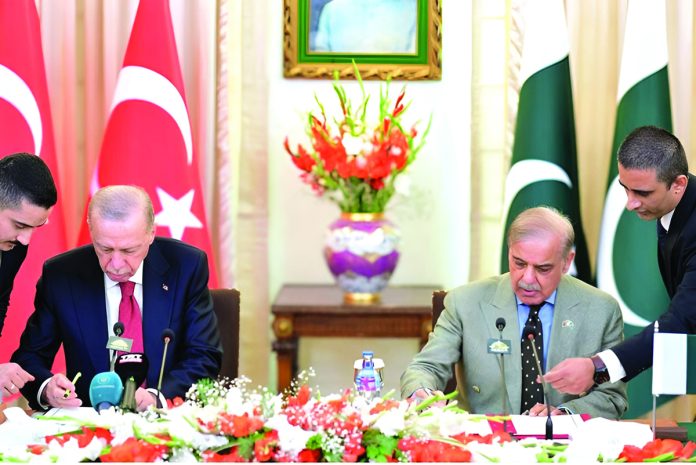Dr. Farooq Adil
Our region has entered a new era of conflict. One indication of this is the tragic hijacking of the Jafar Express in Balochistan, but to fully grasp the situation, it is essential to see the bigger picture. Terrorism has plagued Pakistan for the past three to four decades, but in recent weeks, its intensity has surged dramatically.
More precisely, it has escalated even further following Turkish President Recep Tayyip Erdogan’s recent visit to Pakistan. Several key leaders have been martyred, and a passenger train in Balochistan was hijacked, resulting in significant loss of life. The loss of human life is always painful, but the abduction of an entire passenger train has brought the situation to new heights of deterioration.
The question is: what is the background of this fresh wave of terrorism, and why did it intensify after President Erdogan’s visit? Answering this critical question could bring us closer to understanding the root of the problem. Once the cause of a problem is understood, finding its solution becomes relatively easier. To comprehend the region’s current strategic situation, President Erdogan’s visit to Pakistan holds a key position. Meetings and discussions between Pakistani and Turkish leadership are not uncommon, but their significance at this particular moment is extraordinary. It was just last year when President Erdogan and Prime Minister Shehbaz Sharif met at the D-8 Conference in Cairo.
During the meeting, Erdogan remarked that Providence had entrusted Shehbaz Sharif with Pakistan’s leadership at a crucial time. The world is moving past old conflicts and entering a new era, he noted, adding that there is a need to explore and nurture new pathways rather than relying on long, outdated routes. To achieve this, it is essential to form an initial dialogue mechanism involving three fraternal nations with exemplary mutual trust and cooperation: Pakistan, Turkiye, and Azerbaijan.
President Erdogan’s recent visit to Pakistan was a follow-up to this proposal, and Prime Minister Shehbaz Sharif’s subsequent visit to Azerbaijan was part of the same context, finalizing the trilateral dialogue mechanism. The question is: what will be the significance of this mechanism? I posed this question to the Republic of Turkiye’s ambassador, Dr. Irfan Nazir Oglu. Dr. Irfan Nazir Oglu is not just an ambassador but also a visionary and a sincere friend of Pakistan.
Responding to my question, he stated that Pakistan and Turkiye, as friendly nations, stand at a historic juncture where their vision and actions could not only ensure the development and prosperity of both brotherly nations but also transform the fate of the entire region. The detailed explanation behind Dr. Oglu’s statement is that this region could connect Turkiye to Greater Eurasia via Pakistan. For this purpose, a corridor named the “Middle Corridor” has been proposed. This corridor would support the China-Pakistan Economic Corridor (CPEC) while maintaining its unique identity and proving beneficial for the region.
The next question that arises is: what is the connection between this initiative and the recent surge in terrorism in Pakistan? The recent assassination of Darul Uloom Haqqania Akora Khattak’s head, Maulana Hamid-ul-Haq Haqqani, is a chilling incident. Similarly, the killing of Jamiat Ulema-e-Islam (F) leader Mufti Abdul Baqi Noor Zai near Quetta Airport demands attention. What could possibly be the motive behind these two high-profile assassinations? Understanding this motive can provide insight into the implications of the recent wave of terrorism.
Religious groups, especially institutions like Darul Uloom Haqqania and religious parties like Jamiat Ulema-e-Islam, have historically supported activities labeled as jihad in this region. Over the past three to four decades, the changing forms, objectives, and outcomes of this jihad have lifted many veils for the patrons of these jihadi groups. They now understand that these activities carried out in the name of religion not only tarnished the reputation of religion itself but also plunged the entire region, including Pakistan, into a state of perpetual instability.
These groups have now begun to rise above past emotionalism and make decisions based on ground realities. Consequently, militants operating in the name of religion are losing the support of Pakistan’s religious factions. These militants now fear that their support base will collapse in the days to come. In this backdrop, their desperate strategy is to instill fear and terror among religious groups. Additionally, Pakistan’s religious factions are optimistic about CPEC and Gwadar’s great future and do not wish to obstruct its path. This makes them a target for a second reason.
Another aspect of the situation that must be considered is the newfound alliance between groups like the Tehrik-i-Taliban Pakistan (TTP) and separatists advocating for ethnic and linguistic divisions. Many of their activities now support one another. Afghanistan’s interest in the Jafar Express incident stems from this very alliance. In summary, all these negative forces aim to disrupt the region’s economic integration with other parts of the world, and they are being used by unseen hands like India and other forces for this purpose. The hijacking of the Jafar Express aimed to scare off powers like China and others invested in the region.
Can they succeed? The answer is no. The reason is that all stakeholders, including Pakistan, are deeply committed to these initiatives. One might even say they have put everything on the line and are unwilling to back down. This is why we now stand at the doorway of a new conflict.
The author is a mass media theorist and former advisor to the President of Pakistan.










